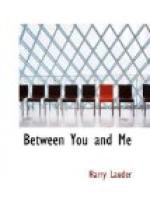I maun think of labor when I think of the Anzacs. Yon is a country different frae any I have known. There’s no landed aristocracy in the land of the Anzac. Yon’s a country where all set out on even terms. That’s truer there, by far, than in America, even. It’s a young country and a new country, still, but it’s grown up fast. It has the strength and the cities of an old country, but it has a freshness of its own.
And there labor rules the roost. It’s one of the few places in the world where a government of labor has been instituted. And yet, I’m wondering the noo if those labor leaders in Australia have reckoned on one or twa things I think of? They’re a’ for the richts of labor—and so am I. I’d be a fine one, with the memory I have of unfairness and exploitation of the miners in the coal pits at Hamilton, did I not agree that the laboring man must be bound together with his fellows to gain justice and fair treatment from his employers.
But there’s a richt way and a wrong way to do all things. And there was a wrong way that labor used, sometimes, during the war, to gain its ends. There was sympathy for all that British labor did among laboring men everywhere, I’m told—in Australia, too. But let’s bide a wee and see if labor didn’t maybe, mak’ some mistakes that it may be threatening to mak’ again noo that peace has come.
Here’s what I’m afraid of. Labor used threats in the war. If the government did not do thus and so there’d be a strike. That was meanin’ that guns would be lacking, or shell, or rifles, or hand grenades, or what not in the way of munitions, on the Western front. But the threat was sae vital that it won, tae often I’m no saying it was used every time. Nor am I saying labor did not have a richt to what it asked. It’s just this—canna we get alang without making threats, one to the other?
And there were some strikes that had serious consequences. There were strikes that delayed the building of ships, and the making of cannon and shell. And as a result of them men died, in France, and in Gallipoli, and in other places, who need no have died. They were laddies who’d dropped all, who’d gi’en up all that was dear to them, all comfort and safety, when the country called.
They had nae voice in the matters that were in dispute. None thought, when sic a strike was called, of hoo those laddies in the trenches wad be affected. That’s what I canna forgie. That’s what makes me wonder why the Anzacs, when they reach home, don’t have a word to say themselves aboot the troubles that the union leaders would seem to be gaein’ to bring aboot.
We’re in a ficht still, even though peace has come. We’re in a ficht wi’ poverty, and disease, and all the other menaces that still threaten our civilization. We’ll beat them, as we ha’ beaten the other enemies. But we’ll no beat them by quarrelling amang oorselves, any more than we’d ever have beaten the Hun if France and Britain had stopped the war, every sae often, to hae oot an argument o’ their own. We had differences with our gude friends the French, fraw time to time. Sae did the Americans, and whiles we British and our American cousins got upon ane anither’s nerves. But there was never real trouble or difficulty, as the result and the winning of the war have shown.




